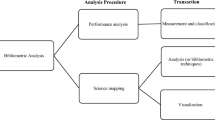Abstract
Evaluations of the factors contributing to the quality and utility of sponsored research have indicated that characteristics of the researchers and funding arrangements tend to explain differences among projects. This article examines the validity of assumptions about the effects of organizational environment, funding level, and project duration on the outcome of funded research. The results of this study suggest a need to reexamine ideas about the determinants of research quality and utility, and implications for managers of research studies are drawn from the findings.
Similar content being viewed by others
References
Abrahamson, M.A. (1978).The funding of social knowledge production and application. Washington, D.C.: National Academy of Sciences.
Barber, R.J. (1966).The politics of research. Washington, DC: The Public Affairs Press.
Bernstein, I.N. & Freeman, H.E. (1975).Academic and entrepreneurial research. New York: Russell Sage Foundation.
Brooks, H. (1968). The future growth of academic research. In H. Orlans (Ed.),Science policy and the university. Washington, D.C.: The Brookings Institution.
Caplan, N., Morrison, A., & Stambaugh, R.J. (1975).The use of social science knowledge in policy decisions at the national level. Ann Arbor, Michigan: University of Michigan, Institute for Social Research.
Deshpande, R., & Zaltman, G. (1983). Patterns of research use in private and public sectors.Knowledge: Creation, Diffusion, Utilization, 4 (4), 561–575.
Gordon, G. & Marquis, S. (1966). Freedom, visibility of consequences, and scientific innovation.American Journal of Sociology, 72, 195–202.
Johnson, K. (1985). Research influence in decision making to control and prevent violence.Knowledge: Creation, Diffusion, Utilization, 7(2), 161–189.
Hanrahan, J.D. (1983).Government by contract. New York: W.W. Norton and Company.
Hargrove, E.C. (1975)The missing link. Washington, DC: The Urban Institute.
Kidd, C.V. (1959).American universities and federal research. Cambridge, MA: Belknap Press.
Kornhauser, W. (1962).Scientists in industry: Conflict and accommodation. Berkeley: University of California Press.
Lynn, L. (Ed.) (1979).Studies in the management of social R & D. Washington, DC: National Academy of Sciences.
National Institute of Law Enforcement and Criminal Justice. (1977). Law Enforcement Assistance Administration.A response to understanding crime. Washington, DC.
National Science Foundation. (1987). Division of Science Resources Studies.Federal R&D funding by budget function, FY 86–88. Washington, DC.
Orlans, H. (1973).Contracting for knowledge. San Francisco: Jossey-Bass.
Parsons, T. (1951). The institutionalization of scientific investigation.The Science System. New York: Free Press.
Patton, M. (1978).Utilization focused evaluation. Beverly Hills, CA.: Sage Publications.
Rich, R.F. (1979).Translating evaluation into policy. Beverly Hills, CA.: Sage Publications.
Rogers, E.M. & Shoemaker, F.F. (1971).Communication of innovations (2nd ed.). New York: The Free Press.
Rossi, P.H., Freeman, H.E., & Wright, S.R. (1979).Evaluation: A systematic approach. Beverly Hills, CA: Sage Publications.
Rossi, P.H., & Williams, W. (1972).Evaluating social programs, theory, practice and politics. New York: Seminar Press.
Saks, M.J. & Baron, C.H. (Eds.) (1980).The use, nonuse, and misuse of applied social research in the courts. Cambridge, MA: Abt Books.
Salasin, S.E., & Davis, H.R. (1978). Facilitating the utilization of evaluation: A rocky road. In I. Deardoff et al. (Eds.),Evaluation of Community Mental Health Services. Washington, DC: Department of Health Education and Welfare.
Seidel, A.D. (1981). Underutilized research.Knowledge: Creation, Diffusion, Utilization, 3(2), 233–248.
Stokes, D. (Ed.). (1978).The federal investment in knowledge of social problems (vol 1). Washington, DC: National Academy of Sciences.
Thomas, J. (1982). Federal funding and policing research.Knowledge: Creation, Diffusion, Utilization, 3(3), 339–369.
U.S. General Accounting Office. (1986).National Institute of Education’s procurement practices. Washington, DC: U.S. Government Printing Office.
U.S. House of Representatives. (1977, June 22–July 21).Federal role in criminal justice and crime research. Joint Hearings before the Subcommittee on Crime of the Committee on the Judiciary and the Subcommittee on Domestic and International Scientific Planning of the Committee on Science and Technology, 95th Congress, First Session. Washington, DC.
Weiss, C.H. (1972).Evaluation research. Englewood Cliffs, NJ: Prentice Hall.
Weiss, C.H. (1978). Improving the linkage between social research and public policy. In L. E. Lynn, Jr. (ed.),Knowledge and policy: The uncertain connection. Washington, DC: National Academy of Sciences.
Weiss, C.H. The Many Meanings of Utilization.Public Administration Review, Sept/Oct 1979, 426–431.
Weiss, C.H., & Bucuvalas, M.J. (1980).Social science research design and decision-making. New York: Columbia Press.
White, S.O. & Krislow, S. (Eds.). (1977).Understanding crime: An evaluation of the National Institute of Law Enforcement and Criminal Justice. Washington, DC: National Academy of Sciences.
Wholey, J.S. (1983).Evaluation and effective public management. Boston: Little, Brown and Company.
Whorton, J., Dunn, D., & Feldt, J. (1986, April).Exploring the criteria used to evaluate public administration research: A social judgment analysis of academicians and practitioners. Paper presented at the annual meeting of the American Society for Public Administration, Anaheim, CA.
Williams, W. (1971).Social policy research and analysis. New York: American Elsevier Publishing Company.
Wilson, J.Q. (1982).Review of departmental research. Unpublished memorandum submitted to Depty Atttorney General Edward C. Schmultz. Washington, DC: U.S. Department of Justice.
Wirt, J.G., Lieberman, A.J., & Levien, R.E. (1975).R & D management: Methods used by federal agencies. Lexington, MA: Lexington Books.
Yin, R.K. & Gwaltney, M.K. (1981). Knowledge utilization as a networking process.Knowledge: Creation, Diffusion, Utilization, 2(4), 555–580.
Author information
Authors and Affiliations
Additional information
Her research focuses on research utilization and issues relating to the public workforce. Dr. Wise also has worked as a consultant to the director of the National Institute of Justice from January, 1983 to August, 1984.
Rights and permissions
About this article
Cite this article
Wise, L.R. Academics and entrepreneurs: Factors affecting the quality and utility of government-sponsored research. Knowledge in Society 1, 85 (1988). https://doi.org/10.1007/BF03177549
DOI: https://doi.org/10.1007/BF03177549




